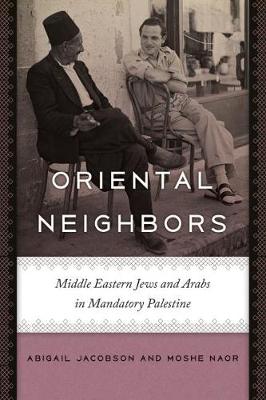
Stock image for illustration purposes only - book cover, edition or condition may vary.
Oriental Neighbors: Middle Eastern Jews and Arabs in Mandatory Palestine
Abigail Jacobson
€ 122.94
FREE Delivery in Ireland
Description for Oriental Neighbors: Middle Eastern Jews and Arabs in Mandatory Palestine
Hardback. A fresh look at Jewish-Arab relations in Palestine under the British Mandate Num Pages: 288 pages. BIC Classification: 1FBP; 3JJ; HBJF1; HBLW. Category: (P) Professional & Vocational. Dimension: 229 x 152 x 25. Weight in Grams: 522.
Focusing on Oriental Jews and their relations with their Arab neighbors in Mandatory Palestine, this book analyzes the meaning of the hybrid Arab-Jewish identity that existed among Oriental Jews, and discusses their unique role as political, social, and cultural mediators between Jews and Arabs. Integrating Mandatory Palestine and its inhabitants into the contemporary Semitic-Levantine surroundings, Oriental Neighbors illuminates broad areas of cooperation and coexistence, which coincided with conflict and friction, between Oriental and Sephardi Jews and their Arab neighbors. The book brings the Oriental Jewish community to the fore, examines its role in the Zionist nation-building process, and studies its diverse and complex links with the Arab community in Palestine.
Product Details
Format
Hardback
Publication date
2017
Publisher
University Press of New England
Condition
New
Number of Pages
288
Place of Publication
Hanover, United States
ISBN
9781512600056
SKU
V9781512600056
Shipping Time
Usually ships in 7 to 11 working days
Ref
99-1
About Abigail Jacobson
ABIGAIL JACOBSON is the academic director of the Mediterranean Neighbors program, Van Leer Jerusalem Institute. She is the author of From Empire to Empire: Jerusalem between Ottoman and British Rule. MOSHE NAOR is assistant professor in the department of Israel Studies at the University of Haifa. He is the author of Social Mobilization in the Arab/Israeli War of 1948: On the Israeli Home Front.
Reviews for Oriental Neighbors: Middle Eastern Jews and Arabs in Mandatory Palestine
Jacobson and Naor assert that what united the Mizrahi Jews during this period was their deep confidence that they could serve as mediators between Jews and Arabs. One of the factors was their fluency in Arabic. . . . The shared language enabled Mizrahi Jews to maintain meaningful relationships with Muslim and Christian Arabs; and, achieving quite different purposes, it also afforded them opportunities to collect intelligence and play a strategic role as the drive for Jewish statehood intensified.
The Jewish News of Northern California [Oriental Neighbors] contains a wealth of examples of attempts at dialogue between Arabs and Mizrahi Jews - efforts that emphasized their ethnic, linguistic, cultural and geographical closeness, despite tensions between the Zionist and Palestinian movements.
Haaretz [Oriental Neighbors] tackles the issue of coexistence between Arabs and Jews in Mandatory Palestine; more accurately, between Arabs and Sephardic and Oriental Jews. They had a culture, a language and a way of life very close to those of the Arabs, with they lived in close contact. The authors analyze the close relations, coexistence and co-operation between the two communities, without neglecting the points of tension and friction between the two parties.
Eunomia Interesting and scholarly. It works on one level as a straightforward history of Oriental Jews in Palestine but is equally a story both of Zionism and of the unfolding Jewish-Palestinian conflict within Mandate Palestine. The detail is fascinating. The authors feel the texture of the Jewish community in Mandate Palestine and in doing so they challenge notions of Jewishness among the Jews who lived alongside Palestinians and who articulated hybrid identities.
Middle Eastern Studies
The Jewish News of Northern California [Oriental Neighbors] contains a wealth of examples of attempts at dialogue between Arabs and Mizrahi Jews - efforts that emphasized their ethnic, linguistic, cultural and geographical closeness, despite tensions between the Zionist and Palestinian movements.
Haaretz [Oriental Neighbors] tackles the issue of coexistence between Arabs and Jews in Mandatory Palestine; more accurately, between Arabs and Sephardic and Oriental Jews. They had a culture, a language and a way of life very close to those of the Arabs, with they lived in close contact. The authors analyze the close relations, coexistence and co-operation between the two communities, without neglecting the points of tension and friction between the two parties.
Eunomia Interesting and scholarly. It works on one level as a straightforward history of Oriental Jews in Palestine but is equally a story both of Zionism and of the unfolding Jewish-Palestinian conflict within Mandate Palestine. The detail is fascinating. The authors feel the texture of the Jewish community in Mandate Palestine and in doing so they challenge notions of Jewishness among the Jews who lived alongside Palestinians and who articulated hybrid identities.
Middle Eastern Studies
